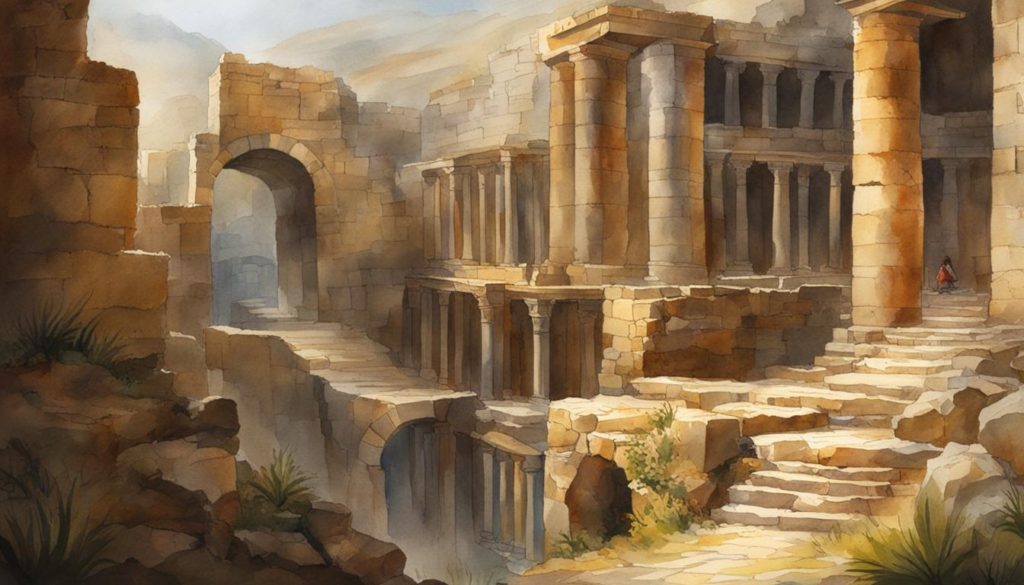The authorship of the Bible is a topic of great curiosity and importance for many people. Understanding who wrote each book of the Bible allows us to delve deeper into the sacred scriptures and appreciate the diverse perspectives that contributed to its composition. In this article, we will explore the authors of the books found in the Bible that the Catholics read and shed light on the intricate process of biblical authorship.
Key Takeaways:
- The Bible was not officially compiled until the late fourth century by the Catholic Church.
- The Old Testament books were written before Jesus’ Incarnation, while the New Testament books were written by the end of the first century A.D.
- The authors of each book in the Bible were guided by divine inspiration and the influence of their own unique perspectives.
- The canon of the Bible was determined by the early leaders of the Catholic Church, with criteria such as inspiration, apostolic origin, and use in the Church.
- The Septuagint version of the Old Testament, which includes additional books, is accepted by the Catholic Church but not by Protestant Bibles.
Divine Inspiration and Human Authors
The Bible is a unique book that combines divine inspiration with the contribution of human authors. According to Catholic belief, God is considered the ultimate author of the Scriptures, and the Holy Spirit guided the human authors as they wrote. This divine inspiration ensured that the Bible contains the sacred and timeless truths that Christians hold dear.
However, the human authors also played a significant role in the writing of the Bible. They used their own unique perspectives, writing styles, and cultural backgrounds to convey God’s message. Each book of the Bible has its own genre, such as historical narrative, poetry, or prophecy, which reflects the personality and goals of its human author.
It is important to recognize that while the Bible is a divine work, it is also a human work. The human authors were not simply passive instruments, but actively participated in the process of writing the Scriptures. Their individual voices and experiences bring depth and richness to the biblical text.
The Role of the Holy Spirit
The Holy Spirit played a crucial role in the inspiration of the Bible. The Spirit guided the human authors, ensuring that their words accurately conveyed God’s message and were free from error. This divine inspiration does not negate the unique contributions of the human authors; rather, it elevates their work to a sacred level.
Through the collaboration of divine inspiration and human authorship, the Bible becomes a remarkable testament to God’s love and plan for humanity. It speaks to people of all generations, providing guidance, wisdom, and comfort.
Development of the Canon
The development of the biblical canon is a fascinating journey that spans centuries of religious history. It was the early leaders of the Catholic Church who were responsible for determining which books should be included in the Bible. Guided by the Holy Spirit, they carefully evaluated each text and applied specific criteria to determine its sacredness and authenticity.
The determination of scripture involved several factors. One key criterion was the special relation to God. The Church recognized that certain books carried a unique authority and conveyed the divine message to humanity. These books were seen as bearing witness to God’s revelation throughout history.
Another important factor was the apostolic origin of the books. The early Church emphasized the importance of connecting the biblical texts to the teachings of the apostles, who were directly appointed by Jesus. Books that could be traced back to these apostolic origins were considered to have reliable and authoritative content.
The use of the books in Church services and their universal acceptance among Christian communities also played a significant role in the canonization process. The early Church recognized the value of these texts in guiding their worship and faith practices. The universality of their use further affirmed their importance and relevance to the Christian community as a whole.
| Criteria for Canonization | Explanation |
|---|---|
| Special relation to God | Books that carried a unique authority and conveyed the divine message. |
| Apostolic origin | Books that could be traced back to the teachings of the apostles. |
| Use in Church services | Books that were recognized and utilized in worship and faith practices. |
| Universal acceptance | Books that were universally accepted and embraced by Christian communities. |
By the late fourth century, the canon of Scripture was officially compiled, solidifying the list of books included in the Bible. Although there were subsequent reaffirmations by councils, the canonization process was largely completed at this time. The Catholic Church has continued to accept the Septuagint version of the Old Testament, which includes additional books not found in Protestant Bibles.

Exploring the historical context of the Bible provides valuable insights into the complex process of its formation. From the reliance on oral tradition to the inclusion of different books in various canons, the Bible’s journey from ancient manuscripts to the sacred text we have today is a testament to the profound impact it has had on countless lives.
Conclusion
The authorship of the Bible is a remarkable collaboration between divine inspiration and human authors. The Catholic Church played a vital role in the development of the biblical canon, ensuring that the sacred scriptures were preserved and passed down through generations.
With the guidance of the Holy Spirit, the human authors of the Bible wrote with their own unique perspectives, contributing to the diverse genre and style found within its pages. While God is considered the ultimate author, the human authors brought their own personalities and goals to their writings, creating a rich tapestry of divine truth and human experience.
The determination of which books should be included in the Bible was not made by Jesus or the Apostles, but rather by the early leaders of the Catholic Church. Through careful consideration and the guidance of the Holy Spirit, they established the canon based on criteria such as inspiration, apostolic origin, and use in Church services. The canon was officially compiled in the late fourth century and reaffirmed by subsequent councils.
It is important to note that the Catholic Church accepts the Septuagint version of the Old Testament, which includes additional books not found in Protestant Bibles. This acceptance highlights the significance of the role played by the Catholic Church in the development and preservation of the biblical canon.
FAQ
Who wrote each book of the Bible that Catholics read?
The authors of the books in the Bible are a combination of divine inspiration and human authors. God is considered the ultimate author of the Scriptures, while the human authors played a role in writing the various books. Each book has its own genre and style, influenced by the personality and goals of its human author.
What is the role of divine inspiration and human authors in the Bible?
The Bible is considered to be inspired by God, with the Holy Spirit guiding the human authors as they wrote. The Scriptures are a combination of divine truth and the unique perspectives of the human authors.
How was the canon of the Bible determined?
The canon of Scripture, or the list of books included in the Bible, was determined by the early leaders of the Catholic Church, guided by the Holy Spirit. The criteria for canonization included special relation to God, apostolic origin, use in Church services, and universal use. The canon was officially compiled in the late fourth century and reaffirmed by subsequent councils. The Catholic Church accepts the Septuagint version of the Old Testament, which includes additional books not found in Protestant Bibles.
What is the historical context of the Bible?
The Bible was not written as a whole, but rather through a long process of oral tradition and written compilation. The early followers of Jesus relied on oral tradition to pass on stories and teachings. The Septuagint version of the Scriptures, used by the early Church, included additional books not in the Hebrew Masoretic text. The canon of the Old Testament was established by the Church and accepted the Septuagint as its base. Martin Luther and the Protestant Reformers later used the Masoretic canon for their Old Testament.
What is the role of the Catholic Church in the development of the Bible?
The Catholic Church played a crucial role in the development of the biblical canon, determining which books should be included in the Bible based on criteria such as inspiration, apostolic origin, and use in the Church. The canon was established in the late fourth century and reaffirmed by subsequent councils. The Catholic Church accepts the Septuagint version of the Old Testament, which includes additional books not found in Protestant Bibles. Understanding the history of the Bible and its authors allows us to appreciate the rich tapestry of divine and human collaboration that has given us the sacred scriptures.

